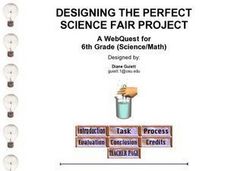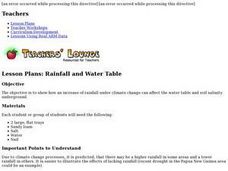Curated OER
Designing the Perfect Science Fair Project Webquest
Sixth graders examine the Scientific Method and define their topic of interest. Students familiarize themselves with how to utilize their resources and create note cards. Students create their written report and display of their...
US Department of Energy
Sunlight and Evaporation
Here is a simple inquiry experiment designed to demonstrate that the energy from sunlight can evaporate water. Young scientists follow provided procedural steps to construct a model of our atmosphere using a bowl, a cup, water and...
Curated OER
Teach Science
The students will be learning a Science concept, through a hands-on investigation, well enough to teach it and also understanding
PowerPoint¿¿ in order to create their presentation. Through this presentation a group of students will be...
Curated OER
The Story of the Solar System
There is more to the solar system than the typical study of the sun and planets. Launch a study of asteroids, meteoroids, and comets by watching the video The Story of the Solar System, available for purchase through this...
Carnegie Mellon University
Marcellus Shale: Who Pays?
After viewing short clips of unfortunate events, your class will consider two sides of a homeowner's court case, and then learn about the Marcellus shale deposit beneath the state of Pennsylvania and the hydraulic fracturing process. In...
Alabama Learning Exchange
Safety in the Science lab
High schoolers work in groups to write and produce a video on laboratory safety. They use video equipment correctly and effectively work in groups. They develop basic acting skills with the help of peers and drama teacher.
Curated OER
Dissolved Gases in Water
Using different types of water, earth science explorers set out to prove the ocean's ability to absorb greenhouse gases. They shake, heat, and freeze the water samples to examine gas content. This lesson plan is useful during a unit...
Curated OER
Environmental Changes
High school scientists reasearch and illustrate changes in the local environment and consider relationships among agriculture, industry, economy, natural events, and social interactions. They construct a timeline to discover if there are...
Curated OER
Global Warming
This contains a writing prompt about global warming that could be adapted in a number of ways. The resource provides some information about global warming and possible effects. Learners explore the enhanced greenhouse effect and the...
Curated OER
Rainfall and Water Table
Through inquiry, experimentation, and observation, young scientists see how an increase in rainfall under climate change can affect the water table and soil salinity underground. Young scientists build models that represent the...
Curated OER
Reason for the Seasons
Young scientists examine why we have seasons on Earth, and how the motion of the Earth around the Sun causes them. Groups of learners are given a variety of balls, a bamboo stick, a marker, and a flashlight, then use the objects to...
Curated OER
The Pacific and El Niño
El Nino, and the climate changes that go along with it, are the focus of this Earth Science lesson. Learners pay particular attention to the wind patterns that are established on Earth, and look at weather maps to see how El Nino can...
Curated OER
When Land Ice Melts
The Artctic and Antarctic Ice caps are the focus of this Earth science lesson. In reality, this is more of a demonstration than a lesson, but there is some rich discussion that happens before, during, and after the demonstration takes...
Curated OER
Exploring Caves
Students explain why many caves have become National Parks. They determine that caves provide shelter from enemies, and from bad weather in the summer or the winter, and provide certain mineral resources. They discover that ancient art...
Curated OER
Science and the Envrionment
Young scholars utilize a digital camera to record interesting objects in their environment. In this ecology lesson, students participate in a mini-field trip around their campus as they take 2-3 pictures of the school environment....
Curated OER
Science Test B-Grade 5
For this grade 5 science test worksheet, 5th graders complete a 30 question multiple choice quiz covering a variety of grade 5 concepts.
Curated OER
Earth and Space Science
Students investigate space travel. For this science lesson, students discuss the space station and its representation in orbit. They talk about food, travel and survival in space with the correct equipment.
Carnegie Mellon University
Hydroelectricity
Use a simple PowerPoint presentation to introduce you environmental studies class to hydropower. Hold a debate about the pros and cons of developing this form of alternative energy. Power up your class with this simple instructional...
Curated OER
The Water Cycle - Main Components
Present the water cycle to your middle schoolers with this lesson. After an anticipatory set, they participate in a Q & A session about the terms associated with the water cycle: evaporation, transpiration, condensation, and...
Curated OER
Science Test-Plant Life Cycle
In this Life Science worksheet, 8th graders match the vocabulary with the list while being tested on terms related to plant reproduction.
Curated OER
Science Quiz: Plants
In this science quiz worksheet, students match words or phrases to their definition. Students explore topics dealing with parts of a seeds, traits of plants, and uses of seed plants. Students solve 12 multiple choice problems.
Curated OER
Greek Prefixes In Science
Seventh graders look into their science textbooks to find words that utilize the Greek prefixes, "anti," "epi," "endo," and "micro." Student pairs complete a worksheet embedded in the plan where they list as many of these words as they can.
Curated OER
Lesson: Can-Do Canoe
Collaborative groups work together with a variety of materials to design an eight-inch canoe that floats for at least three minutes. There is no direct instruction involved in this plan, just a list of materials and a procedure for...
Curated OER
Watershed Landscape
Students demonstrate how water flows by building a human watershed using themselves. In this ecology lesson, students compare and contrast point-source and non-point source pollution. They write what they have learned from this activity...

























